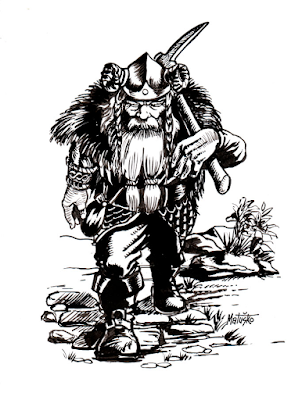Let's play a game of Twenty Questions about fantastic beings.
Do they appear in the writings of Tolkien? Yes.
Do they love gold and gems and other beautiful things? Yes.
Do they hoard those beautiful things? Yes.
Are their hoards found deep within mountains? Yes.
Are they tough and resistant to disease and fire? Yes.
Who are they, dragons or dwarves? Both! In fact, the two share many similarities, and I propose that one begat the other.
The last surviving dragon conceived of beings who shared his passions to provide him with company until the end of his days. He belched forth fire and with his red-hot flames he molded his creations from rock and stone. Therefore, they anointed him the Dragon Smith.
However as they multiplied so did their great works of craftsmanship, and in the dragon's greed he pressed them into servitude. And so for him they labored, enlarging his great hoard until they slew him and reclaimed it all. Yet his dwarves retain many features of their overthrown creator to this very day.
 |
| It's off to work he goes. (by Sedeslav on DeviantArt) |
The dwarves indeed proved tough and hard to tame; they ill endure the domination of others, and the thoughts of their hearts are hard to fathom ...
-- Tolkien, J.R.R. The Silmarillion.
Al-Razi famously calls the mind of a dragon unfathomable; and into each dwarf was lodged one of the Dragon Smith's unfathomable thoughts. Even the most cunning cannot grasp a dwarf's inner self but for mere moments before that comprehension dissolves.
So while they befriend or antagonize with speedy ease, to a dwarf those feelings are just as fleeting. No one leaves lasting impression on a dwarven mind, and nothing can effect the purpose that drives each dwarf.
They are stone-hard, stubborn, fast in friendship and in enmity, and they suffer toil and hunger and [...] fire more hardily than either Elves or Men ...
-- Tolkien, J.R.R. The Silmarillion.
Infused with the essence of the Dragon Smith's hide, his dwarves sprung forth as tough as steely scales and resistant to all but the most blistering flames. They can toil before the forge for time indeterminable, and painstakingly pry pristine gems forth from the deep, all to please their greedy creator.
Far over the misty mountains cold, to dungeons deep and caverns old, we must away, ere break of day, to seek our pale enchanted gold. [...]
As they sang the hobbit felt the love of beautiful things made by hand and by cunning and by magic moving through him, a fierce and a jealous love, the desire of the hearts of dwarves.
-- Tolkien, J.R.R. The Hobbit.
As a mirror of the Dragon Smith's passions, a lust for beautiful objects drives a dwarf, just as a longing for glory drives a man. Though at times muted by the tedium of daily life, like fire it can be rekindled from even the smallest embers.
They used their rings [of power] only for the getting of wealth; but wrath and an overmastering greed of gold were kindled in their hearts ...
-- Tolkien, J.R.R. The Silmarillion.
And when stoked to roaring flames by enmity or trickery, their ever-present gold-lust becomes all-consuming. It devours their passion to create. All that remains is a passion to acquire.
A physical transformation follows gradually, imperceptibly, but finally: the overmastered dwarf becomes a flightless wyrm (1), twisted by greed into a pale imitation of its creator.
He made first of the Seven Fathers of the Dwarves in a hall under the mountains [...] and laid them to rest in far-sundered places ...
It is said that the foundation of each of the Seven Hoards of the Dwarf-kings of old was a golden ring; but all of these hoards long ago were plundered ...
-- Tolkien, J.R.R. The Silmarillion.
Though only one ancient hoard has been unearthed in a thousand years, Al-Razi speculates it to be but a fraction of the Dragon Smith's original mother lode.
Since, like he who shaped them, dwarves prefer to live in places dark and deep, those who seek the rest of the Dragon Smith's great trove should look beneath the elder mountains. It is likely that the Dwarf-kings sought such vaults of stone in which to stash their glittering hoards after slaying their creator.
| A dragon-born dwarf race-as-class for Basic D&D |
(1) For a great adventure that features this very concept, check out The Black Wyrm of Brandonsford.
